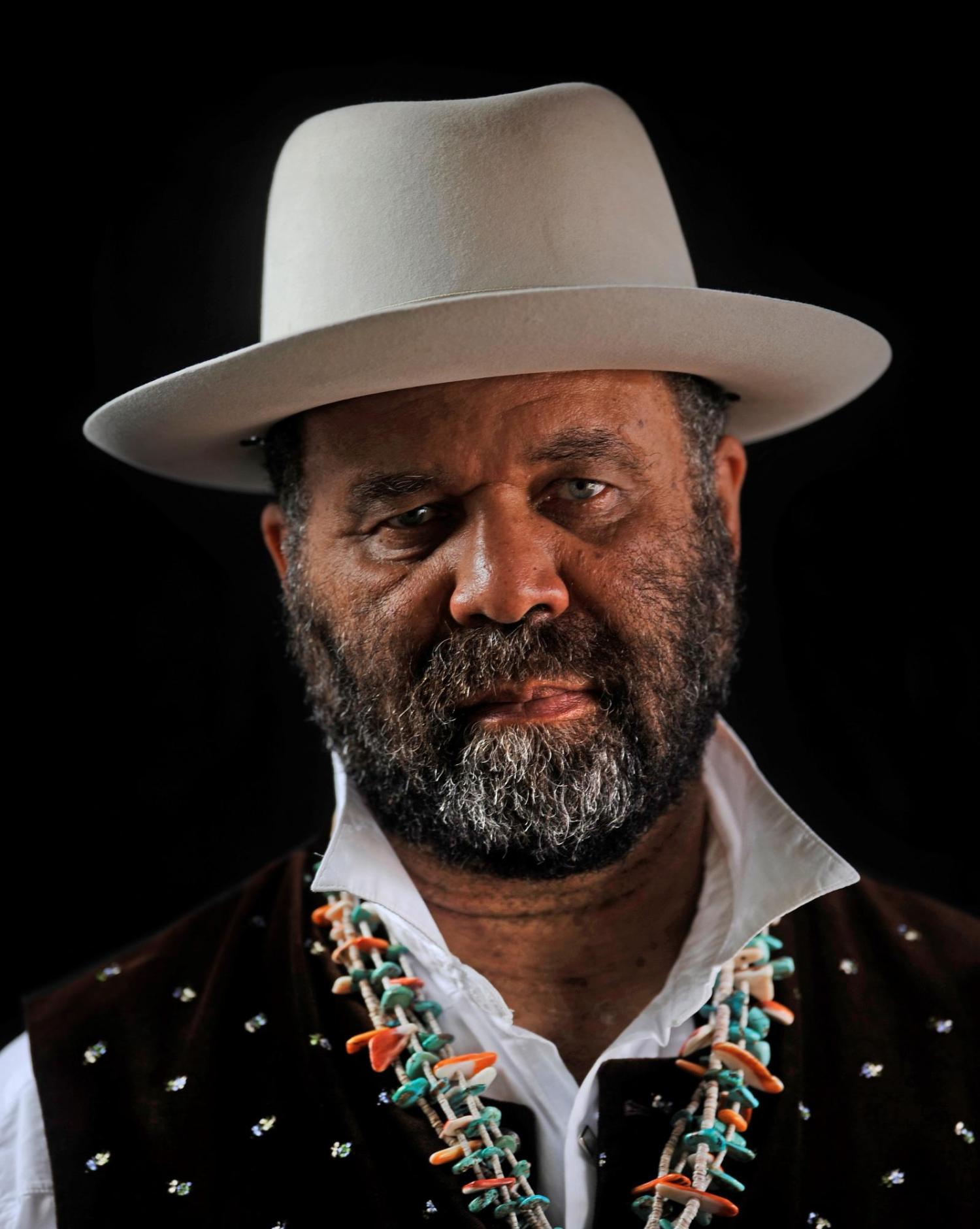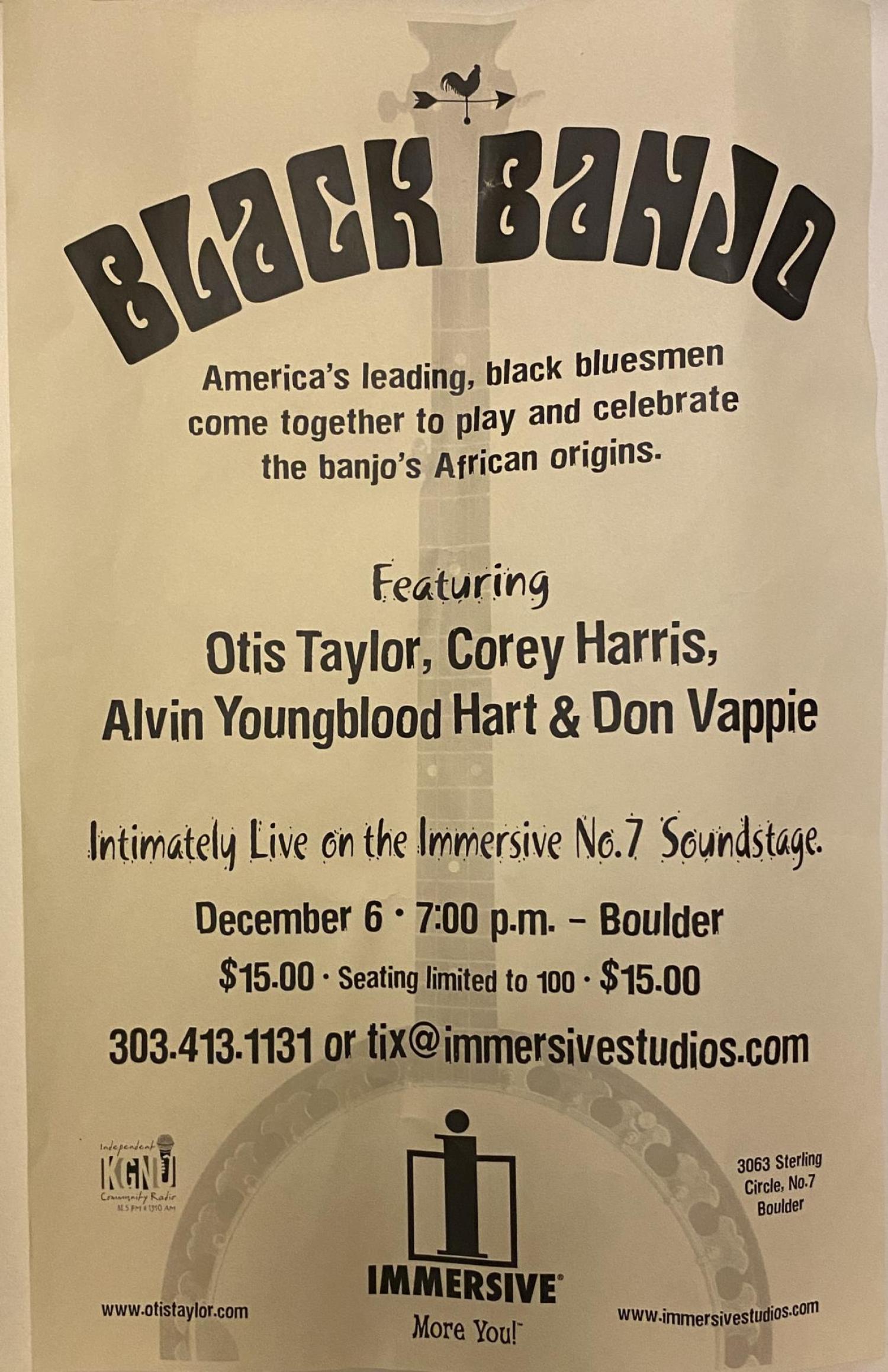Materials from renowned blues banjo player Otis Taylor now a part of CU’s American Music Research Center’s archival collections
The origins of the banjo began with Black musical tradition and the genre is now experiencing a resurgence with a new generation of Black musicians.
Otis Taylor—an internationally renowned and Boulder-based blues banjo player—has been at the forefront of Black banjo music and materials from his decades-long career are now part of the University of Colorado Boulder’s American Music Research Center (AMRC) archival collections housed in the University Libraries’ Rare and Distinctive (RaD) Collections.
“This is a very significant acquisition for RaD and the AMRC,” said Megan Friedel, lead archivist and head of collections management and stewardship for RaD. “Having Otis Taylor’s collection at CU furthers the AMRC’s mission to become a center for research and teaching on American popular music that has been traditionally underrepresented in the historical record.”
The collection features nearly 100 boxes of materials documenting Taylor’s entire musical career including handwritten first drafts of lyrics, musical recordings, photographs and ephemera from tours such as t-shirts and posters.
“The Otis Taylor collection is a rich addition to the center’s public-facing initiatives and knowledge production through research by scholars interested in the study of American music,” said AMRC Interim Director and Associate Professor of Ethnomusicology Austin Okigbo.
Jointly housed between the CU Boulder College of Music and University Libraries, the AMRC supports the research, performance and preservation of all musics of the Americas, with a particular emphasis on the diversity of musics from the United States. The center is home to a rare music repository of scores, papers, recordings and material artifacts that document the history of American music—now including the Taylor collection.
Recapturing the banjo
Taylor was born in Chicago in 1948 and moved to Denver when he was young. His interest in music began with his parents who were jazz fans and locally at the Denver Folklore Center where he first heard several blues artists.
Taylor began to play music on the banjo, but soon rejected the instrument for the guitar and harmonica after learning of the banjo’s associations with minstrel shows and the white American South.
While still in his teens, he formed a band called the Butterscotch Fire Department and later the Otis Taylor Blues Band.
In 1977, he stopped playing publicly, due to changes in the music business, pursuing a career selling high-end antiques, but he returned to performing in 1995 to play at the opening of Buchanan’s Coffee Pub on University Hill in Boulder. At the urging of Kenny Passarelli, renowned bass player for Elton John and Joe Walsh’s Barnstorm, Taylor returned to the studio.
In the years that followed, Taylor released 15 albums winning awards and recognitions in the blues community. Taylor became an international recording and touring artist for several record labels and also had his music selected for Hollywood feature films and television shows.
During this time, he also learned about the African roots of the banjo and picked it back up to produce the 2008 album, Recapturing the Banjo, which highlighted several accomplished contemporary Black banjo players and honored the roots of the banjo while taking it in a bold new musical direction.
In recent years, Taylor and his wife Carol created a blues in the schools program called “Writing the Blues” which acknowledges the history of the blues and encourages original songwriting, and in 2019 he was inducted into the Colorado Music Hall of Fame.

Portrait of Otis Taylor taken by Evan Semón
Significant for CU Boulder
The Otis Taylor collection fits within AMRC’s commitment to collecting Colorado music and showcasing its influence internationally.
“I’m honored that my musical legacy is being added to the American Music Research Center’s archival collections in RaD,” said Taylor. “After several meaningful collaborations with the AMRC in recent years, I know my collection is in good hands. My hope is that future students and scholars will continue to learn about the evolution of American blues and its significance in world music.”
The collection is also the AMRC’s first major acquisition since they partnered with RaD in 2023 to establish a new collection development policy that prioritizes acquiring materials reflective of the expansive history and creative output of underrepresented historic and contemporary American composers, dancers and performers, as well as music histories outside the mainland United States.
“Otis Taylor has regaled me with stories about the blues rock tradition for many years,” said Reiland Rabaka, founder and director of the Center for African & African American Studies. “I have been regularly blown away by Mr. Taylor reminiscing about jamming with Jimi Hendrix, Taj Mahal, Buddy Guy, Bruce Springsteen, Vernon Reid, and Elvis Costello, among others. His genre-defying music is steeped in both tradition and innovation because it emerges at the intersection where blues, folk, gospel, rhythm & blues, and rock & roll meet and mash-up. Taylor's blues is simultaneously ancient and Afrofuturist, classic and contemporary, and it transcends today and provides a soundtrack for the beauty and ugly of tomorrow. I am absolutely overjoyed that CU’s American Music Research Center will house the Otis Taylor collection and preserve his important musical life and legacy for generations to come.”
Seeing the collection
RaD and AMRC completed the acquisition of the Otis Taylor collection in fall 2023, and RaD archivists are currently working to inventory the collection materials, with the goal to open the collection to researchers in fall 2024. The collection will remain closed to research until that time.
While the collection is in process, researchers with questions about the collection can reach out to rad@colorado.edu.

Black Banjo flier from collection

